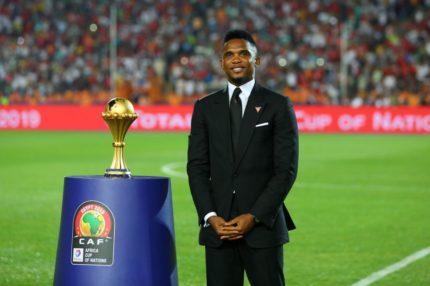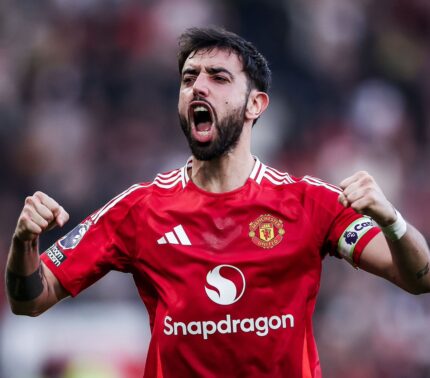Cameroonian Football Federation (Fecafoot) president Samuel Eto’o has been banned from attending any international matches involving the Central African country for six months. The ban, imposed by a FIFA disciplinary panel, comes after the former Barcelona and Chelsea striker was found to have breached two articles of FIFA’s disciplinary code during the Under-20 Women’s World Cup match between Cameroon and Brazil in September.
The 43-year-old, who attended the game in Bogota, Colombia, is now prohibited from attending all football matches involving both the men’s and women’s representative sides of Cameroon. FIFA’s ruling cited violations of the principles of fair play and offensive behavior, reinforcing that the ban is effective immediately. This suspension will have an immediate impact, with Cameroon’s men’s team set to face Kenya in a crucial Africa Cup of Nations qualifying double-header in October.
Samuel Eto’o’s Troubled Time in Office
Samuel Eto’o’s tenure as president of Fecafoot has been far from smooth, with the latest FIFA ban adding to a string of controversies. In July, the Confederation of African Football (CAF) fined Samuel Eto’o $200,000 for breaching its ethics code. The violation was tied to his signing a contract with betting company 1XBET, which CAF deemed as “seriously violating” principles of integrity and sportsmanship.
While Samuel Eto’o’s legal team has vowed to appeal the CAF decision, the controversies have marred his presidency. Despite a successful career as a player, Samuel Eto’o’s leadership at Fecafoot has been marked by disputes and dissatisfaction. Last year, amateur clubs in Cameroon called for his resignation, citing serious irregularities in the management of Fecafoot. Additionally, his decision-making style has drawn criticism from former teammates, with one describing him as a “dictator” due to his unilateral leadership approach.
Fallout from FIFA and CAF Decisions
The FIFA sanction is the latest setback for Samuel Eto’o, who has been involved in multiple high-profile disputes during his presidency. Earlier this year, he was embroiled in a conflict with Cameroon’s Ministry of Sports over the appointment of Marc Brys as head coach of the national team. Despite his initial opposition, Samuel Eto’o eventually accepted the Belgian coach’s appointment after months of discord.
Samuel Eto’o’s ban will prevent him from being present at key international fixtures, such as the October Africa Cup of Nations qualifiers. This may further strain his already contentious relationship with various stakeholders within Cameroonian football. With multiple controversies surrounding his leadership, questions have arisen about the long-term stability and governance of football in Cameroon under Samuel Eto’o’s administration.
As FIFA’s decision stands, the former football star’s influence will be significantly reduced during this critical period, raising concerns about the direction Fecafoot will take in his absence.
Samuel Eto’o’s Legacy Under Scrutiny Amid Suspension
Samuel Eto’o, a former football legend with an illustrious career at clubs such as Barcelona and Inter Milan, now faces one of the toughest challenges of his administrative career. His leadership at FECAFOOT, marked by reforms and ambitious projects, is now overshadowed by this disciplinary action. The timing of the ban is particularly crucial as the Cameroonian men’s national team prepares for a vital double-header against Kenya in their AFCON 2025 qualifying campaign.
Despite his achievements on the pitch, including four World Cup appearances and multiple UEFA Champions League titles, Eto’o’s tenure as FECAFOOT president may now be called into question. The federation has yet to issue an official statement on the matter, but the absence of their president during such a crucial period will undoubtedly spark internal discussions about the future direction of Cameroonian football. Whether Eto’o can recover from this setback and continue to lead FECAFOOT effectively remains to be seen














